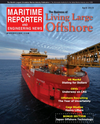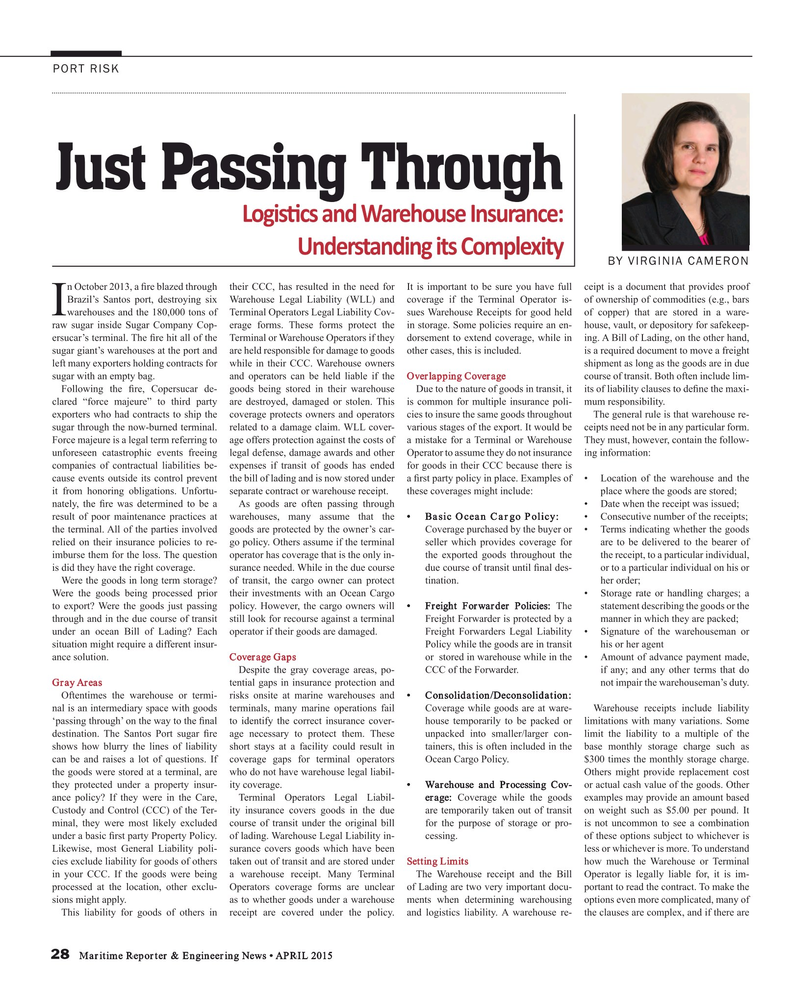
Page 28: of Maritime Reporter Magazine (April 2015)
Offshore Edition
Read this page in Pdf, Flash or Html5 edition of April 2015 Maritime Reporter Magazine
PORT RISK
Just Passing Through
Logist cs and Warehouse Insurance:
Understanding its Complexity
BY VIRGINIA CAMERON n October 2013, a ? re blazed through their CCC, has resulted in the need for It is important to be sure you have full ceipt is a document that provides proof
Brazil’s Santos port, destroying six Warehouse Legal Liability (WLL) and coverage if the Terminal Operator is- of ownership of commodities (e.g., bars
I warehouses and the 180,000 tons of Terminal Operators Legal Liability Cov- sues Warehouse Receipts for good held of copper) that are stored in a ware- raw sugar inside Sugar Company Cop- erage forms. These forms protect the in storage. Some policies require an en- house, vault, or depository for safekeep- ersucar’s terminal. The ? re hit all of the Terminal or Warehouse Operators if they dorsement to extend coverage, while in ing. A Bill of Lading, on the other hand, sugar giant’s warehouses at the port and are held responsible for damage to goods other cases, this is included. is a required document to move a freight left many exporters holding contracts for while in their CCC. Warehouse owners shipment as long as the goods are in due sugar with an empty bag. and operators can be held liable if the Overlapping Coverage course of transit. Both often include lim-
Following the ? re, Copersucar de- goods being stored in their warehouse Due to the nature of goods in transit, it its of liability clauses to de? ne the maxi- clared “force majeure” to third party are destroyed, damaged or stolen. This is common for multiple insurance poli- mum responsibility. exporters who had contracts to ship the coverage protects owners and operators cies to insure the same goods throughout The general rule is that warehouse re- sugar through the now-burned terminal. related to a damage claim. WLL cover- various stages of the export. It would be ceipts need not be in any particular form.
Force majeure is a legal term referring to age offers protection against the costs of a mistake for a Terminal or Warehouse They must, however, contain the follow- unforeseen catastrophic events freeing legal defense, damage awards and other Operator to assume they do not insurance ing information: companies of contractual liabilities be- expenses if transit of goods has ended for goods in their CCC because there is cause events outside its control prevent the bill of lading and is now stored under a ? rst party policy in place. Examples of • Location of the warehouse and the it from honoring obligations. Unfortu- separate contract or warehouse receipt. these coverages might include: place where the goods are stored; nately, the ? re was determined to be a As goods are often passing through • Date when the receipt was issued; result of poor maintenance practices at warehouses, many assume that the • Basic Ocean Cargo Policy: • Consecutive number of the receipts; the terminal. All of the parties involved goods are protected by the owner’s car- Coverage purchased by the buyer or • Terms indicating whether the goods relied on their insurance policies to re- go policy. Others assume if the terminal seller which provides coverage for are to be delivered to the bearer of imburse them for the loss. The question operator has coverage that is the only in- the exported goods throughout the the receipt, to a particular individual, is did they have the right coverage. surance needed. While in the due course due course of transit until ? nal des- or to a particular individual on his or
Were the goods in long term storage? of transit, the cargo owner can protect tination. her order;
Were the goods being processed prior their investments with an Ocean Cargo • Storage rate or handling charges; a to export? Were the goods just passing policy. However, the cargo owners will • Freight Forwarder Policies: The statement describing the goods or the through and in the due course of transit still look for recourse against a terminal Freight Forwarder is protected by a manner in which they are packed; under an ocean Bill of Lading? Each operator if their goods are damaged. Freight Forwarders Legal Liability • Signature of the warehouseman or situation might require a different insur- Policy while the goods are in transit his or her agent ance solution. Coverage Gaps or stored in warehouse while in the • Amount of advance payment made,
Despite the gray coverage areas, po- CCC of the Forwarder. if any; and any other terms that do
Gray Areas tential gaps in insurance protection and not impair the warehouseman’s duty.
Oftentimes the warehouse or termi- risks onsite at marine warehouses and • Consolidation/Deconsolidation: nal is an intermediary space with goods terminals, many marine operations fail Coverage while goods are at ware- Warehouse receipts include liability ‘passing through’ on the way to the ? nal to identify the correct insurance cover- house temporarily to be packed or limitations with many variations. Some destination. The Santos Port sugar ? re age necessary to protect them. These unpacked into smaller/larger con- limit the liability to a multiple of the shows how blurry the lines of liability short stays at a facility could result in tainers, this is often included in the base monthly storage charge such as can be and raises a lot of questions. If coverage gaps for terminal operators Ocean Cargo Policy. $300 times the monthly storage charge. the goods were stored at a terminal, are who do not have warehouse legal liabil- Others might provide replacement cost they protected under a property insur- ity coverage. • Warehouse and Processing Cov- or actual cash value of the goods. Other ance policy? If they were in the Care, Terminal Operators Legal Liabil- erage: Coverage while the goods examples may provide an amount based
Custody and Control (CCC) of the Ter- ity insurance covers goods in the due are temporarily taken out of transit on weight such as $5.00 per pound. It minal, they were most likely excluded course of transit under the original bill for the purpose of storage or pro- is not uncommon to see a combination under a basic ? rst party Property Policy. of lading. Warehouse Legal Liability in- cessing. of these options subject to whichever is
Likewise, most General Liability poli- surance covers goods which have been less or whichever is more. To understand cies exclude liability for goods of others taken out of transit and are stored under Setting Limits how much the Warehouse or Terminal in your CCC. If the goods were being a warehouse receipt. Many Terminal The Warehouse receipt and the Bill Operator is legally liable for, it is im- processed at the location, other exclu- Operators coverage forms are unclear of Lading are two very important docu- portant to read the contract. To make the sions might apply. as to whether goods under a warehouse ments when determining warehousing options even more complicated, many of
This liability for goods of others in receipt are covered under the policy. and logistics liability. A warehouse re- the clauses are complex, and if there are 28 Maritime Reporter & Engineering News • APRIL 2015
MR #4 (26-33).indd 28 MR #4 (26-33).indd 28 3/31/2015 11:17:15 AM3/31/2015 11:17:15 AM

 27
27

 29
29
